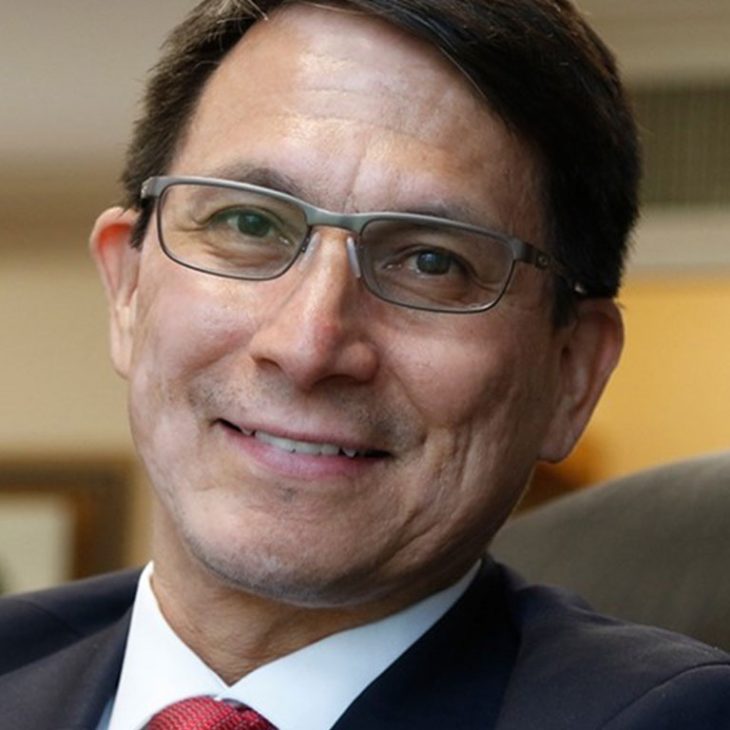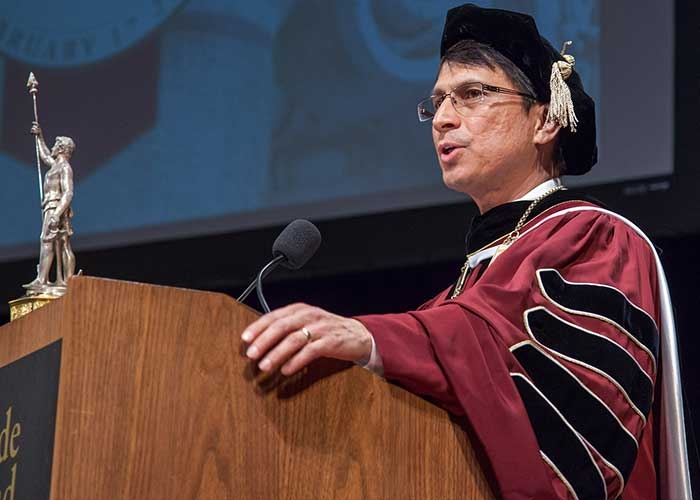Why Students’ Worldviews Matter at Public Universities: A Conversation with Dr. Frank Sánchez
November 21, 2022

Frank Sánchez, president of Rhode Island College from 2016-2022, has been an advocate for diversity, equity and inclusion in higher education since he was a student at the University of Nebraska in the 1980s.
Sánchez grew up in Wyoming, and his passion led him to earn numerous advanced degrees, including a doctorate in higher education from Indiana University, which recently honored him with its distinguished alumni award. Sánchez has also served as Vice Chancellor for Student Affairs at The City University of New York, the nation’s largest urban public university, serving over 500,000 students.
“I’ve always been invested and passionate about modernizing higher education institutions,” he says, “and improving policies and programs, curriculum resources and services to ensure more students succeed.”
One area that merits improvement, he says, is the way public universities and colleges approach students’ religious beliefs and worldviews. As a Senior Fellow for Interfaith America, Sánchez will spend the coming months studying this issue, one he feels has been neglected on too many campuses. He spoke about his work in a conversation with Monique Parsons of Interfaith America Magazine.
The interview has been lightly edited for length and clarity.
Interfaith America Magazine: Dr. Sánchez, what have you noticed about the way religion and religious diversity is addressed on public campuses?
Frank Sánchez: I became really intrigued with why more public higher education institutions are not engaged in this conversation. There’s a hesitancy to engage in faith-based conversations and faith-based organizations. But the reality, and what I’m most interested in, is if we’re trying to produce well-rounded, educated, responsible citizens of the world, then we should be having conversations about the world and worldviews. How do we engage the leadership, the academic community, to see the value of this kind of worldview? Including faith really drives other issues of diversity and equity and inclusion and a sense of belonging. I’m very interested in how we go about framing the conversation, and how we bring more people into the fold, including the leadership of our public institutions, whether it’s the president, or academic leaders, or faculty. I see it as a reframing of the DEI conversation
IAM: When schools are willing to address religion and spirituality, is there an impact on students’ sense of belonging?
FS: The IDEALS study brings some really nice evidence. It provides a compelling case that there are some disciplines, including STEM and business and health care, that actually aren’t particularly welcoming or sensitive to or aware of different faiths. And when you think about the diversity and religious diversity of people in those fields, it raises a pretty good question of, gosh, why are we falling behind here? And how can we tackle that conversation through a public lens in way that invests in and supports the mission of our institution?
IAM: What do you think is at the root of the hesitancy to touch this topic? What have you noticed?
FS: I think it is a reluctance to have a conversation about faith at public institutions. There’s so much going on around DEI. They’re addressing policies around race, gender, gender violence, sexual violence, and things of that nature, and so their hands are full. And I think they’re very careful not to step into a faith-based conversation in a significant way. I do think there’s a reluctance so that they don’t create any perception, particularly among the faculty ranks, perhaps among boards, that they’re getting into an area that perhaps they shouldn’t be spending time on.
IAM: Can you share an example of how you think public campuses can engage religion and diverse religious diversity in a way that really helps students feel like they belong?
FS: That is what I’m investigating with this fellowship. I think what I liked most about the Leadership Forum was this notion of a worldview. Let’s expand that to our students’ understanding of the world around them, which is something we say already. I think if we stay with that language and that framing, I think it’s hard to turn away from that.
Then you talk with faculty and ask, where is it appropriate? Where should those conversations emerge in the curriculum? How should it be embedded in the DEI conversation? How should it be embedded in the training of your Student Affairs and Student Services staff, faculty and administrators? I think those might be some nice touch points with public higher education leaders to say, this shift is part of the DEI work.
“Public institutions are missing an opportunity to better bring that sense of community, that sense of connection, that sense of belonging within an increasingly diverse student community.”
IAM: What else interests you about the IDEALS research?
FS: I’m looking for that compelling data (that shows) the impact of the practices proposed by the study. The deliverables are improved sense of belonging, a sense of connectedness, greater empathy, maybe emotional intelligence, (and) a compassion for diverse communities. At schools where engineering students, business students, and healthcare students are more aware (of religious diversity and religious literacy), those individuals may be more satisfied with their quality of life. Are they more effective and more impactful in their area of employment or in their discipline? Those are some of the questions I want to know, because those are going to be very compelling to a president or to a provost or vice president of student affairs. Our mission is to (graduate) well-rounded, educated, responsible citizens.
IAM: How does your personal religion or worldview inspire you to do this work? And how have interfaith encounters been a part of your experience?
FS: I grew up Catholic, attended Mass religiously, even through my college years. I attended 12 years of CCD classes, first grade through 12th grade. My parents are very religious, and my sister, and really all my family members. For me, I grew not so much in Catholicism, but I certainly have an understanding of a greater kind of reality. I like to say a little prayer. It goes, “Spirit, universe, God, I ask to be of service to you, I leave my faith and trust in your hands, please show me what to do.” That helps me get my head around, not necessarily a religious kind of practice, but certainly an awareness that I’m here for a particular reason. I may or may not be answering your question.
IAM: You are. That’s beautiful. And how about interfaith encounters?
FS: The Mormon community certainly impacted our family. And later in my graduate studies, and certainly my time in New York City, I’ve been exposed to people of many different faiths. I’ve always been in DEI work. My master’s thesis was on first-generation low-income Latino student retention programs that can improve their success. I’ve worked in (Hispanic Serving Institutions), minority serving institutions: Adam State, University of Colorado, Denver, downtown Denver campus. I kind of thought I had a handle on diversity, and I worked in multicultural affairs as well. But then I went to New York City and worked in mediation with Jewish and Palestinian students, and I think that really opened my eyes to say, gosh, the reality is I still have a lot to learn.
When I think about (Interfaith America), I think it’s a great platform for me to continue to learn and help drive a conversation in an area that I think is lacking. Public institutions are missing an opportunity to better bring that sense of community, that sense of connection, that sense of belonging within an increasingly diverse student community. In the end, to be able to deliver quality education, but do it in a way that is more informed of the world as it is today. And that includes a faith perspective.
IAM: Dr. Sánchez, thank you so much.
Share
Related Articles
American Civic Life
Higher Education
Higher Education

Dr. Frank D. Sánchez
For over two and a half decades Dr. Sánchez has advanced higher education policy, programs and services toward improving college completion rates, addressing equity issues and modernizing higher education systems. From 2016-2022, he served as the 1oth President of Rhode Island College following his appointment at the Vice Chancellor for Student Affairs at The City University of New York, the nation’s largest urban public university, serving over 500,000 students. Dr. Sánchez was also the senior student affairs officer at both the University of Colorado Denver and Adams State University.
A native of Cheyenne, Wyoming, Dr. Sánchez holds a Ph.D. from Indiana University in Higher Education Administration with a concentration in Learning, Cognition and Instruction and an M.S. in Student Affairs and Higher Education from Colorado State University. He also holds a B.A. in Psychology with minors in Communications and Chicano Studies from the University of Nebraska-Lincoln. He recently was awarded the Distinguished Alumni Award from the Indiana University School of Education.



